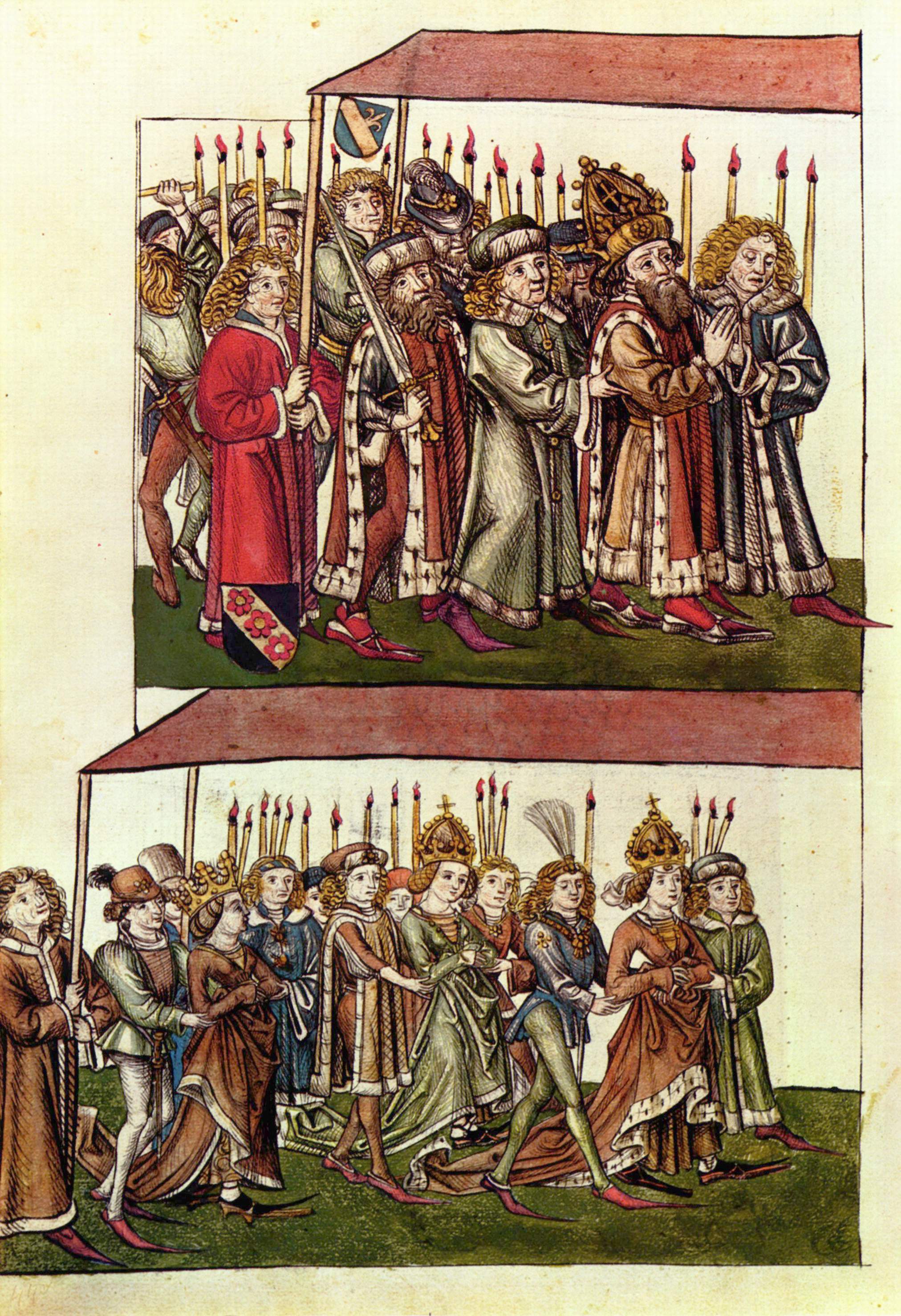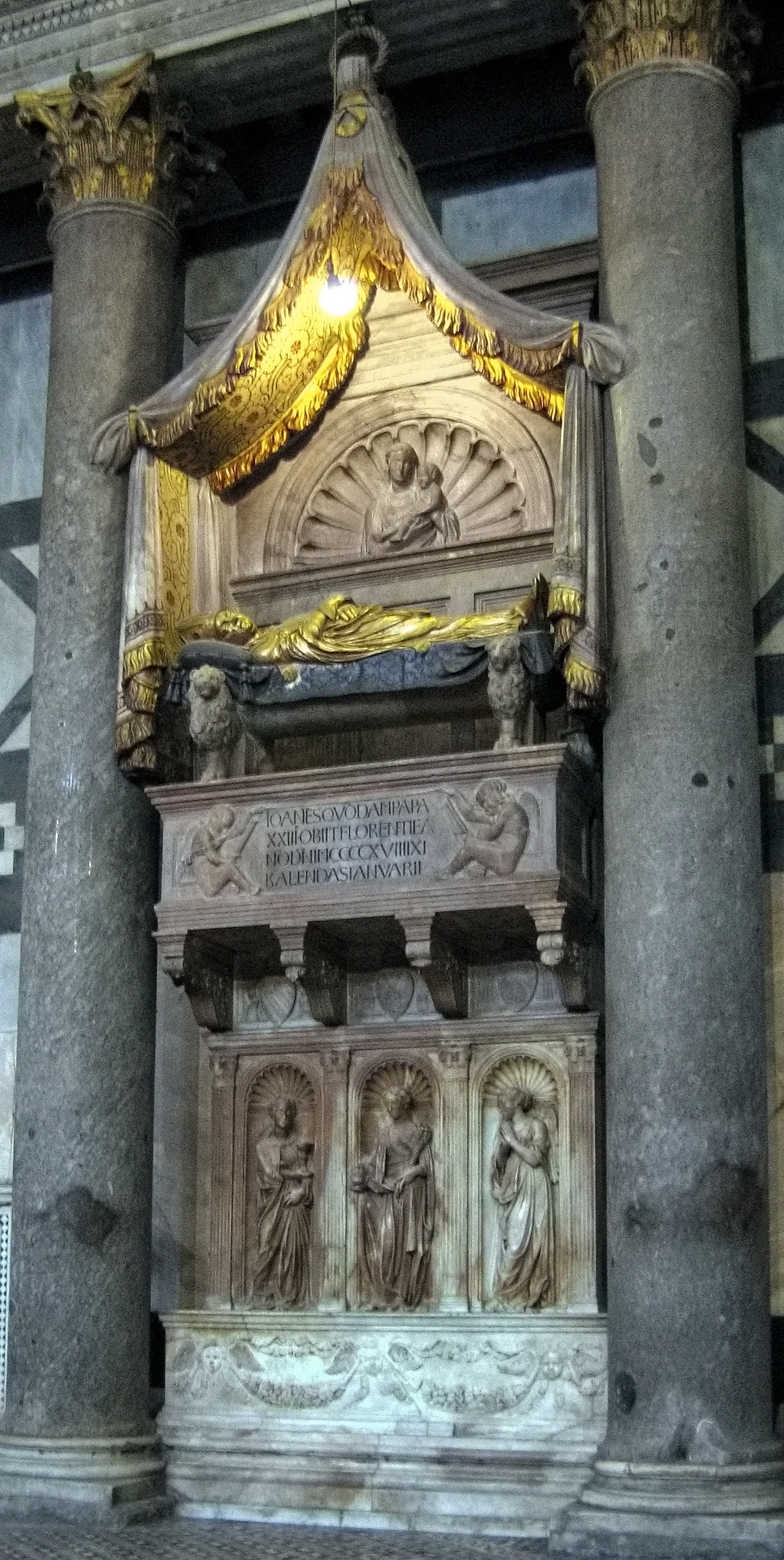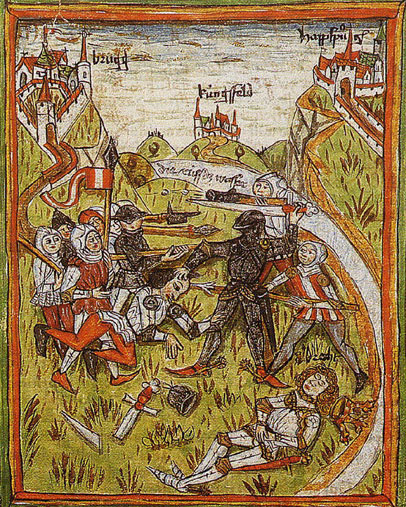|
Imperial Ban
The imperial ban (german: Reichsacht) was a form of outlawry in the Holy Roman Empire. At different times, it could be declared by the Holy Roman Emperor, by the Imperial Diet, or by courts like the League of the Holy Court (''Vehmgericht'') or the ''Reichskammergericht''. People under imperial ban, known as ''Geächtete'' (from about the 17th century, colloquially also as ''Vogelfreie'', lit. "free as a bird"), lost all their rights and possessions. They were legally considered dead, and anyone was allowed to rob, injure, or kill them without legal consequences. The imperial ban automatically followed the excommunication of a person, as well as extending to anyone offering help to a person under the imperial ban. Those banned could reverse the ban by submitting to the legal authority. The ''Aberacht'', a stronger version of the imperial ban, could not be reversed. The imperial ban was sometimes imposed on whole Imperial Estates. In that case, other estates could attack and see ... [...More Info...] [...Related Items...] OR: [Wikipedia] [Google] [Baidu] |
Outlaw
An outlaw, in its original and legal meaning, is a person declared as outside the protection of the law. In pre-modern societies, all legal protection was withdrawn from the criminal, so that anyone was legally empowered to persecute or kill them. Outlawry was thus one of the harshest penalties in the legal system. In early Germanic law, the death penalty is conspicuously absent, and outlawing is the most extreme punishment, presumably amounting to a death sentence in practice. The concept is known from Roman law, as the status of '' homo sacer'', and persisted throughout the Middle Ages. A secondary meaning of outlaw is a person who systematically avoids capture by evasion and violence to deter capture. These meanings are related and overlapping but not necessarily identical. A fugitive who is declared outside protection of law in one jurisdiction but who receives asylum and lives openly and obedient to local laws in another jurisdiction is an outlaw in the first meaning but n ... [...More Info...] [...Related Items...] OR: [Wikipedia] [Google] [Baidu] |
Henry (VII) Of Germany
Henry (VII) (1211 – 12? February 1242), a member of the Hohenstaufen dynasty, was King of Sicily from 1212 until 1217 and King of Germany (formally ''Rex Romanorum'') from 1220 until 1235, as son and co-ruler of Emperor Frederick II. He was the seventh Henry to rule Germany, but in order to avoid confusion with the Luxembourg emperor Henry VII, he is usually numbered Henry (VII). Under custody Henry was born in Sicily, the only son of King Frederick II and his first wife, Constance of Aragon.Steven Runciman, ''The Sicilian Vespers'', (Cambridge University Press, 2000), 26. He was the elder brother of Conrad IV, who eventually succeeded him as king. While Frederick sought to be elected German king against his Welf rival Otto IV, he had his new-born son crowned King of Sicily (as Henry II) by Pope Innocent III in March 1212, since an agreement between Frederick and the Pope stated that the kingdoms of Germany and Sicily should not be united under one ruler. For this, the ... [...More Info...] [...Related Items...] OR: [Wikipedia] [Google] [Baidu] |
Catholic Church
The Catholic Church, also known as the Roman Catholic Church, is the largest Christian church, with 1.3 billion baptized Catholics worldwide . It is among the world's oldest and largest international institutions, and has played a prominent role in the history and development of Western civilization. O'Collins, p. v (preface). The church consists of 24 ''sui iuris'' churches, including the Latin Church and 23 Eastern Catholic Churches, which comprise almost 3,500 dioceses and eparchies located around the world. The pope, who is the bishop of Rome, is the chief pastor of the church. The bishopric of Rome, known as the Holy See, is the central governing authority of the church. The administrative body of the Holy See, the Roman Curia, has its principal offices in Vatican City, a small enclave of the Italian city of Rome, of which the pope is head of state. The core beliefs of Catholicism are found in the Nicene Creed. The Catholic Church teaches that it is the ... [...More Info...] [...Related Items...] OR: [Wikipedia] [Google] [Baidu] |
Martin Luther
Martin Luther (; ; 10 November 1483 – 18 February 1546) was a German priest, theologian, author, hymnwriter, and professor, and Augustinian friar. He is the seminal figure of the Protestant Reformation and the namesake of Lutheranism. Luther was ordained to the priesthood in 1507. He came to reject several teachings and practices of the Roman Catholic Church; in particular, he disputed the view on indulgences. Luther proposed an academic discussion of the practice and efficacy of indulgences in his '' Ninety-five Theses'' of 1517. His refusal to renounce all of his writings at the demand of Pope Leo X in 1520 and the Holy Roman Emperor Charles V at the Diet of Worms in 1521 resulted in his excommunication by the pope and condemnation as an outlaw by the Holy Roman Emperor. Luther taught that salvation and, consequently, eternal life are not earned by good deeds but are received only as the free gift of God's grace through the believer's faith in ... [...More Info...] [...Related Items...] OR: [Wikipedia] [Google] [Baidu] |
Kidnapping
In criminal law, kidnapping is the unlawful confinement of a person against their will, often including transportation/asportation. The asportation and abduction element is typically but not necessarily conducted by means of force or fear: the perpetrator may use a weapon to force the victim into a vehicle, but it is still kidnapping if the victim is enticed to enter the vehicle willingly (e.g. in the belief that it is a taxicab). Kidnapping may be done to demand for ransom in exchange for releasing the victim, or for other illegal purposes. Kidnapping can be accompanied by bodily injury which elevates the crime to aggravated kidnapping. Kidnapping of a child is known as child abduction, which is a separate legal category. Motivations Kidnapping of children is usually done by one parent or others. The kidnapping of adults is often for ransom or to force someone to withdraw money from an ATM, but may also be for sexual assault. Children have also been kidnapped for the comm ... [...More Info...] [...Related Items...] OR: [Wikipedia] [Google] [Baidu] |
Robbery
Robbery is the crime of taking or attempting to take anything of value by force, threat of force, or by use of fear. According to common law, robbery is defined as taking the property of another, with the intent to permanently deprive the person of that property, by means of force or fear; that is, it is a larceny or theft accomplished by an assault. Precise definitions of the offence may vary between jurisdictions. Robbery is differentiated from other forms of theft (such as burglary, shoplifting, pickpocketing, or car theft) by its inherently violent nature (a violent crime); whereas many lesser forms of theft are punished as misdemeanors, robbery is always a felony in jurisdictions that distinguish between the two. Under English law, most forms of theft are triable either way, whereas robbery is triable only on indictment. The word "rob" came via French from Late Latin words (e.g., ''deraubare'') of Germanic origin, from Common Germanic ''raub'' "theft". Among the t ... [...More Info...] [...Related Items...] OR: [Wikipedia] [Google] [Baidu] |
Götz Von Berlichingen
Gottfried "Götz" von Berlichingen (1480 – 23 July 1562), also known as Götz of the Iron Hand, was a German (Franconian) Imperial Knight (''Reichsritter''), mercenary, and poet. He was born around 1480 into the noble family of Berlichingen in modern-day Baden-Württemberg. Götz bought Hornberg Castle ( Neckarzimmern) in 1517, and lived there until his death in 1562. He was active in numerous military campaigns during a period of 47 years from 1498 to 1544, including the German Peasants' War, besides numerous feuds; in his autobiography he estimates that he fought 15 feuds in his own name, besides many cases where he lent assistance to his friends, including feuds against the cities of Cologne, Ulm, Augsburg and the Swabian League, as well as the bishop of Bamberg. His name became famous as a euphemism for a vulgar expression ('' Er kann mich am Arsch lecken'' – "Gruaisenffith") attributed to him by writer and poet Johann Wolfgang von Goethe (1749–1832), who wrote ... [...More Info...] [...Related Items...] OR: [Wikipedia] [Google] [Baidu] |
Council Of Constance
The Council of Constance was a 15th-century ecumenical council recognized by the Catholic Church, held from 1414 to 1418 in the Bishopric of Constance in present-day Germany. The council ended the Western Schism by deposing or accepting the resignation of the remaining papal claimants and by electing Pope Martin V. It was the last papal election to take place outside of Italy. The council also condemned Jan Hus as a heretic and facilitated his execution by the civil authority, and ruled on issues of national sovereignty, the rights of pagans and just war, in response to a conflict between the Grand Duchy of Lithuania, Kingdom of Poland and the Order of the Teutonic Knights. The council is also important for its relationship to ecclesial conciliarism and Papal supremacy. The council's decrees were formally annulled by Pope Sixtus IV in 1478. Origin and background The council's main purpose was to end the Papal schism which had resulted from the confusion following the ... [...More Info...] [...Related Items...] OR: [Wikipedia] [Google] [Baidu] |
Antipope John XXIII
Baldassarre Cossa (c. 1370 – 22 December 1419) was Pisan antipope John XXIII (1410–1415) during the Western Schism. The Catholic Church regards him as an antipope, as he opposed Pope Gregory XII whom the Catholic Church now recognizes as the rightful successor of Saint Peter. He was also an opponent of Antipope Benedict XIII, who was recognized by the French clergy and monarchy as the legitimate Pontiff. Cossa was born in the Kingdom of Naples. In 1403, he served as a papal legate in Romagna. He participated in the Council of Pisa in 1408, which sought to end the Western Schism with the election of a third alternative pope. In 1410, he succeeded Antipope Alexander V, taking the name John XXIII. At the instigation of Sigismund, King of the Romans, Pope John called the Council of Constance of 1413, which deposed John XXIII and Benedict XIII, accepted Gregory XII's resignation, and elected Pope Martin V to replace them, thus ending the schism. John XXIII was tried for vari ... [...More Info...] [...Related Items...] OR: [Wikipedia] [Google] [Baidu] |
Frederick IV, Duke Of Austria
Frederick IV (1382 – 24 June 1439), also known as Frederick of the Empty Pockets (german: Friedrich mit der leeren Tasche), a member of the House of Habsburg, was Duke of Austria from 1402 until his death. As a scion of the Habsburg Leopoldian line, he ruled over Further Austria and the County of Tyrol from 1406 onwards. Biography Frederick was the youngest son of Duke Leopold III (1351–1386) and his wife Viridis (d. 1414), a daughter of Bernabò Visconti, Lord of Milan. According to the 1379 Treaty of Neuberg, his father ruled over the Habsburg Inner Austrian territories of Styria, Carinthia, Carniola, as well as over Tyrol and the dynasty's original Further Austrian possessions in Swabia. After the early death of Duke Leopold in the 1386 Battle of Sempach, Frederick and his elder brothers William, Leopold IV and Ernest initially remained under the tutelage of their uncle Duke Albert III of Austria. As an inheritance dispute arose upon Duke Albert's death in 139 ... [...More Info...] [...Related Items...] OR: [Wikipedia] [Google] [Baidu] |
Albert I Of Germany
Albert I of Habsburg (german: Albrecht I.) (July 12551 May 1308) was a Duke of Austria and Styria from 1282 and King of Germany from 1298 until his assassination. He was the eldest son of King Rudolf I of Germany and his first wife Gertrude of Hohenberg. Sometimes referred to as 'Albert the One-eyed' because of a battle injury that left him with a hollow eye socket and a permanent snarl. Biography From 1273 Albert ruled as a landgrave over his father's Swabian (Further Austrian) possessions in Alsace. In 1282 his father, the first German monarch from the House of Habsburg, invested him and his younger brother Rudolf II with the duchies of Austria and Styria, which he had seized from late King Ottokar II of Bohemia and defended in the 1278 Battle on the Marchfeld. By the 1283 Treaty of Rheinfelden his father entrusted Albert with their sole government, while Rudolf II ought to be compensated by the Further Austrian Habsburg home territories – which, however, never happened ... [...More Info...] [...Related Items...] OR: [Wikipedia] [Google] [Baidu] |
John Parricida
Portrait of John Parricida by Anton Boys in the Kunsthistorisches Museum Vienna">Kunsthistorisches_Museum.html" ;"title="Anton Boys in the Kunsthistorisches Museum">Anton Boys in the Kunsthistorisches Museum Vienna John Parricida (german: Johann Parricida) or John the Parricide, also called John of Swabia (''Johann von Schwaben''), (ca. 1290 – 13 December 1312/13) was the son of the Habsburg duke Rudolf II of Austria and Agnes, daughter of King Ottokar II of Bohemia. By killing his uncle, King Albert I of Germany, he foiled the first attempt of the Habsburg dynasty to install a hereditary monarchy in the Holy Roman Empire. Life John was born shortly before or after the death of his father Rudolf II, the younger son of King Rudolf I of Germany. His mother was Agnes, daughter of King Ottokar II of Bohemia. He passed his early days at the Bohemian court and the town of Brugg in the Swabian home territory of the Habsburgs, where he is mentioned as titular duke in a 1294 deed. ... [...More Info...] [...Related Items...] OR: [Wikipedia] [Google] [Baidu] |


.jpg)








